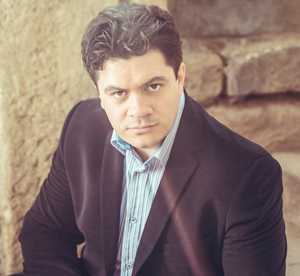by Jarrett Hoffman
At seventeen, Cristian Măcelaru wanted to conduct. First he had to wait.
‘Keep studying violin, then we’ll talk’ was the message from conductor Larry Rachleff, who had inspired Măcelaru’s new interest at Interlochen Arts Camp.
The young violinist took the advice to heart. Now, two decades later, he’s Music Director of the Cabrillo Festival of Contemporary Music; has served as Conductor-in-Residence, Associate, and Assistant Conductor with the Philadelphia Orchestra; and has led subscription concerts with the New York Philharmonic, Chicago Symphony, and Los Angeles Philharmonic.
And on Saturday, August 26 at 8:00 pm, he’ll make his Cleveland Orchestra debut at Blossom Music Center with a program of Dvořák’s Violin Concerto and Holst’s The Planets. “I’m extremely humbled to conduct this orchestra that I’ve admired for my entire life,” he said in a recent conversation.
Before all those successes, Măcelaru earned two degrees in violin, including a master’s at Rice University. Then he stayed on for a master’s in conducting, studying with a familiar face from Interlochen.
“I think Larry understood that once you’re on the podium, it’s quite difficult to continue growing as a musician,” said the Romanian-born conductor. “Learning to connect with people musically is best done while trying to master an instrument, because it forces you to become part of the ensemble.”
He laughed, adding, “The music world doesn’t suffer for lack of young conductors. There’s a plethora of those. What’s needed is more musicians with a very deep knowledge about music.”
Măcelaru said that less than a century ago, people didn’t start conducting until they were more mature. “They went through the opera house, starting as accompanists and coaches, and eventually worked their way up. I’m talking about Solti, Toscanini, or any of the great conductors of the early to mid-20th century.”
Things changed. “In the conducting business, somehow being young and energetic became more important than the substance of the music-making. I’m not criticizing people who choose to go into conducting at age 18 — my gosh, many of them have been incredibly successful. But just because someone is young and successful, does that mean they’ve reached their potential in terms of musical depth?”
The conductor said he’s grateful for Rachleff’s advice. “I wouldn’t do one thing differently. I started in the orchestra. I played in the violin section and I experienced what it’s like, so I understand the psychology of the orchestra on a different level.”
Măcelaru called Augustin Hadelich, who will join him on Saturday in the Dvořák, “an amazing artist — incredible.” After the Concerto he’ll turn to Gustav Holst’s astrological-orchestral suite, featuring the Women of the Blossom Festival Chorus.
“The Planets is so powerful,” said Măcelaru, citing its “bombastic orchestration” and “incredible musical statements.” While he said that the Dvořák begins majestic and strong, “as soon as it starts to develop, it becomes a beautiful, introspective, chamber music-like piece that speaks of intimate moments more than anything else. I hope the pairing sheds a different light on both and influences the way we listen to them.”
Holst was uncomfortable with the renown he earned from The Planets, his most popular work. “Composers don’t choose what they will be remembered by,” said Măcelaru. “Sometimes a piece doesn’t necessarily reflect their most intellectual or deepest thought, but it ends up representing who they are for posterity. I’m not saying The Planets isn’t deep — it’s masterfully crafted, but it’s not a philosophical statement in its musical content. I don’t think Holst expected to have great fame, and at this point, with the way his music has been applied in popular culture, he’s really been propelled to a status that he never would have dreamed of. Had he known, maybe he would’ve composed a very different piece.”
Earlier this month, Măcelaru finished his first summer as Music Director of the Cabrillo Festival. The season closed with the premiere of Karim Al-Zand’s The Prisoner for bass voice and orchestra, a 30-minute commissioned work inspired by the letters of Guantánamo Bay prisoner Adnan Latif to a civil rights lawyer.
“He was one of the first detainees, picked up in 2002,” Măcelaru said. “Latif was cleared by the military, but never by the Department of Justice — nothing to be charged with, yet not released. His letters talk about the violation of basic human rights by a government that is supposed to safeguard those rights. He suffered in prison for a few years and eventually, after several tries, he committed suicide, we are told. Of course it’s not disclosed how. It’s classified, so we don’t actually even know how he died.”
Al-Zand interleaves Latif’s letters with verses of poetry from Rumi, Rilke, and the Book of Psalms that Măcelaru said comment on death and departure. “At the same time, the letters are also full of poetry that inspired Karim because they’re so beautifully written. As a standalone musical work, The Prisoner is incredible. What it represents makes it that much more poignant.”
Măcelaru named Beethoven, Shostakovich, Bernstein, and Corigliano as socially conscious artists he admires. “I’m humbled that I was able to commission this piece from Karim, especially in a time when the government thinks Guantánamo Bay isn’t such a bad place, and we should be expanding it. It’s important for people to understand the human side of the story, the voice of someone who is just a number for us in some ways.”
The conductor said that while he doesn’t consider himself political, staying silent isn’t an option for him. “Do we want to allow this to happen to another innocent person? And if it does, when is it going to be us? My whole point and desire is to help create art that asks a question and makes us think. This piece definitely does that. It gives a voice to someone who does not have one anymore.”
Published on ClevelandClassical.com August 19, 2017.
Click here for a printable copy of this article




